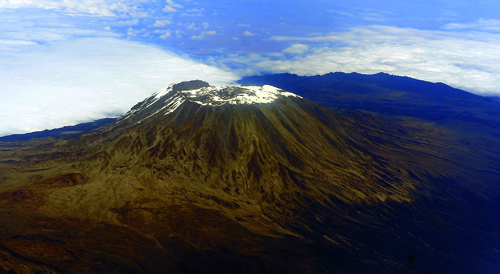|
 |
| Aloyce K. Nzuki, Managing Director of Tanzania's Tourism Board (YU NAN) |
Chinese President Xi Jinping's recent official visit to Tanzania helped enhance China's friendship and cooperation with the East African country, and made the country more popular with Chinese tourists. At the 2013 China Outbound Travel & Tourism Trade Fair in Beijing, Aloyce K. Nzuki, Managing Director of Tanzania's Tourism Board, spoke to ChinAfrica about the development of tourism in Tanzania. Edited excerpts from the interview follow:
ChinAfrica: Tanzania is rich in tourism resources, and the government is promoting the growth of the tourist industry. What kind of measures has your board taken to attract Chinese tourists?
Aloyce K. Nzuki: Tanzania is a very lucky country, rich in natural resources. In terms of wildlife and beautiful natural scenery, Tanzania is ranked second in the world after Brazil. Therefore it is no surprise that Tanzania is home to some World Heritage Sites. Some 30 percent of the country's land is protected areas for forests, wildlife and wetlands. Tanzania is now developing a five-year marketing promotion strategy for tourism. China is our most promising market. We know that the current number of visitors from China is still very small, but we have confidence that this number will grow. We believe this for the following reasons: First, Tanzania and China have a long common and shared history. Second, China had accorded Tanzania "Approved Destination Status." Third, Tanzania is politically stable and peaceful.
Besides this, safaris in Tanzania are very different from those in other countries. We provide a true African wildness experience with beautiful scenery, wild animals and different species. Tanzania is home to three of Africa's seven natural wonders: Mount Kilimanjaro, the Serengeti and the Ngorongoro Crater. We have accommodations in our national and marine parks. We would also like to invite more Chinese tourism agencies to open offices in Tanzania, which will attract more investment from China. And we are planning a cruise boat project, as our country has rich water tourism resources. In addition, investment in airlines is also necessary. We would like to talk with Air China and Hainan Airlines to promote direct air services.
How do you see Chinese President Xi Jinping's visit to Tanzania in March? What impact, in your opinion, will Xi's visit have on the tourism development in your country?
First of all, Tanzania and China have a tradition of brotherly friendship. Diplomatic ties go back to the 1960s. In the 1970s, China gave Tanzania a lot of help - for example, in the building of the Tanzania-Zambia Railway. But the visit in March is the most important sign of all, showing the strong relationship between the two countries. It is a milestone in China and Tanzania's shared history. Tanzania is the first African country that President Xi visited. I think President Xi's visit to Tanzania has made Tanzania very popular now. After the visit, I was told that more and more Chinese people want to apply for visas to travel to Tanzania. So after President Xi's visit, we decided that it was time to go to China and work with China to attract not only tourists, but also investment. We also want to work with Beijing's Chaoyang District to further boost investment and promotion. We would like to promote tourism in a variety of different ways, including via the web, newspapers or television.

What are your expectations for future cooperation in tourism between China and Tanzania?
We expect that the tourism authorities in both countries will work together so that Chinese tourism authorities can assist Tanzania in tourism promotion, planning and research. This is also one of the main purposes of my current visit: to foster cooperation with Chinese research institutions and organizations. As I mentioned, we would like to explore the Chinese market and we will use every available platform to promote Tanzania's tourism industry, including appointing tourism representatives to China. They may be stationed in Beijing, Shanghai or Guangzhou, as we want to build up our presence in China.
What kind of role does tourism play in economic and trade cooperation between the two countries?
Tourism is a priority sector for economic development in my country. Currently, tourism is the second most important service industry in terms of foreign exchange earnings. We make $1.3 billion annually through tourism. Tourism constitutes about 60 percent of our nation's total service exports, and roughly 17 percent of its GDP. China is now the world's top tourism source market. I think our future is in China. We know that the total number of Chinese people traveling abroad every year is around 100 million. Currently, about 20,000 Chinese people visit Tanzania every year. We aim to attract 1 million Chinese tourists a year in the future.
In recent years, China has continued to increase its investment in Tanzania, putting money into the fields of agriculture, electricity, infrastructure, manufacturing, tourism and media. Would you like to comment on Chinese investment in Tanzania?
Current investments will help attract more investments from China. The investments will bring more visitors from China to Tanzania, such as visiting friends and relatives (VFR), business visitors and leisure visitors. We want to attract more investment into other areas, such as agriculture and mining, because the growth of other sectors will promote growth in the tourism industry. One important sector is banking. If Chinese banks established their branches in Tanzania, it would be very convenient for visitors to deposit or withdraw money. More convenient financial services that bridge the distance between the two countries would facilitate tourism. Tourism will grow much more quickly with the support of other sectors.
 |
| Tanzania |
 |
| Tanzania | |